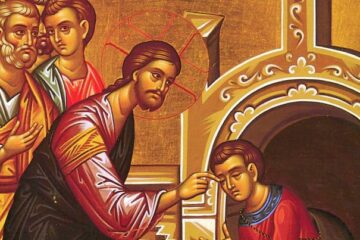The following in an excerpt from “Eros of Orthodoxy,” translated by Fr. Nicholas Palis and written by Mr. Pantelis Paschou.
No one ever dared name any thing of the material or spiritual world, God. Ancient attempts ended in idolatry. How holy, how sacred and lofty must the essence and meaning of love be, for God himself in the Gospel to be named with her name! “God is Love.” As with all holy things, if man holds them in his hands, he “throws them to the dogs,” or changes the meaning and character in an atypical manner analogous with his personal sinfulness and distortion. This has occurred with love as well. Her essence has been diluted by so many of our contemporaries, and has suffered so many changes that she has become unrecognizable…
However, let us consider that almighty Christian weapon called love and what objects or people it has as goals. The Holy Fathers or Orthodoxy will be our guides, for whatever they wrote on love, was not an offspring of the dry, arid, wisdom of the brain, but a fruit of holy experience tried throughout their life, in the inextinguishable furnace of true love.
1. Self
The first aim of love is our self, our more intimate “neighbor”. Love for our own self is a double-edged sword; if one does not know how to use it one slays oneself. The greatest and deepest sea is this love for our own self. However, God does not forbid it since he told us to love our good but not our evil self. We do not love the deeper, inner, spiritual self, but instead our material, exterior self that is the slave to the senses and worldly interests. The love we have for ourselves is not for spiritual things, for the salvation of our soul. Let us loosen it from the chariot of sin and of satan and elevate it to the angelic and divine chariot of virtues, not for the material enjoyments and easy life which the treasures and money we amass promise us. Man, according to St. Maximus, loves money for three reasons: out of voluptuousness, to enjoy his desires with these; from vainglory, to show himself and be glorified by men; or from disbelief when he hordes and guards fearing, against hunger, old age, and sickness. He hopes to be saved more by money rather than by the Heavenly Creator, who pre-thinks and provides both for the blossom in the field as well as for the unprotected meager ant. If love misses her mark in the first goal, she will also miss her mark with the others. Love toward one’s neighbor or towards God is a warm movement of the heart with compassion that reaches, even unto sacrifice. But whoever loves oneself excessively, this movement of the heart is impossible, since according to the world of the Gospel (Matt 6:21), wherever your treasure is found; there also your heart is bonded.
2. Neighbor
The second aim of love is our neighbor. Not the impersonal world but the person, our neighbor and this is the criterion, according to the Evangelist of love, John the Theologian, for whether we love God. If we do not love our neighbor who we see and who wears the image of God, how will we love God? How will we love God, Whom we do not see? The road to love, which stems from our heart and aspires to God, is impossible – if we don’t want to lose our way – not to pass by our neighbor. According to St. Diadochos of Photike, the opposite also occurs. That is, “When one starts to feel God’s love richly, then one starts to love one’s neighbor in the feeling of spirit”. And this spiritual love is not like the fleshly friendships that with the first sign of anxiety dissolves and destroys it. The love that has a spiritual basis, and not material is not affected by provocations or harm: “For in the sweetness of God, the bitterness of an argument dissolves completely”.
Christ, taught us to sacrifice even our lives for our friends: “Greater love has no man than this, that a man lay down his life for his friends” (John 15:13). The great love of the ascetics toward “the utmost desired one,” engendered the love of neighbor as well. Speaking of perfect love toward his brothers Abba Agathon said: “If it were possible for me to find a leper on the road, and I could exchange my body with his, I would do it with all my pleasure”. Let no one say that these are merely words without intent as is mentioned in the “Sayings of the Desert Fathers” concerning Abba Agathon. Once when he was going into the city to sell his handicraft, he found a sick man on the road with no one looking after or caring for him. With love, the elder took him and put him in a room that he purposely rented. Abba remained near the sick person four months, paying the rent, food and medicine from his handicraft until the person became well, at which time Abba Agathon departed “with peace” for his cell in the dessert. Let whoever condemns Orthodox monasticism as “ineffectual,” egotistical and unsociable be attentive to this.
3. God
The third aim of love is God, Love Himself. When man succeeds in loving himself and his neighbor as much as he should, it is natural for him to turn his heart toward God, who taught him love.
Without the gift of theology or of the fruit of perfect love, we sinful men, cannot speak as it merits nor for the eros which the saints feel who forget the stench of earthly enjoyments and are elevated to the vision of God’s unspeakable beauty. “When the mind goes and settles by the eros of love toward God, then it does not feel anything in existence. Illuminated by the divine and infinite light, he is senseless toward his surroundings just as the eye is toward the stars.” (St. Maximus the Confessor) In the writings of the sacred nyptics, they would forget even to eat for entire days out of divine eros and their submersion in the prayer of the heart, “Lord Jesus Christ, Son of God, have mercy on me”.
The philology of the Holy Fathers is inexhaustible on this matter, leaving its particular study for another time, if God wills. We will conclude with a small excerpt of the compunctionate Ladder, where St. John interchanges the names of Love and of God with erotic and warm spiritual expressions: ” O heavenward Love, breath of my breath, console me with your sweet melodic voice because my soul has become fainthearted, considering you and tasting your honey for so long a time, I the unworthy one. O light of my soul, enlighten my mind with your bright, honey-dripping and burning rays, so that I may taste and know how much intoxication the heart receives from your great joy as it reclines at the foot of your stairs, and how much the soul rejoices ascending it with all her desire. And how much her mind is amazed, warmed, and altered when it stands on her high and angelic peak, freed from wicked demons and temporary dangers and passing through the wondrous heavenly door dwelling with its friends, the angels, the saints, and in God eternally. My sweetest Master and most compassionate God, my heavenly Father and eternal King, O white, bright God, Love, it seems to me that I saw you come forth from heaven and you spoke into the ears of my soul saying: “If you do not become free, o my good servant and my beloved child, from the fatness of your body and the weight of your mind, you are not able to see the wondrous beauty of my face! “We are able to face and spiritually enjoy the unspeakable beauty of the divine face only with divine love and the warm divine eros.



0 Comments